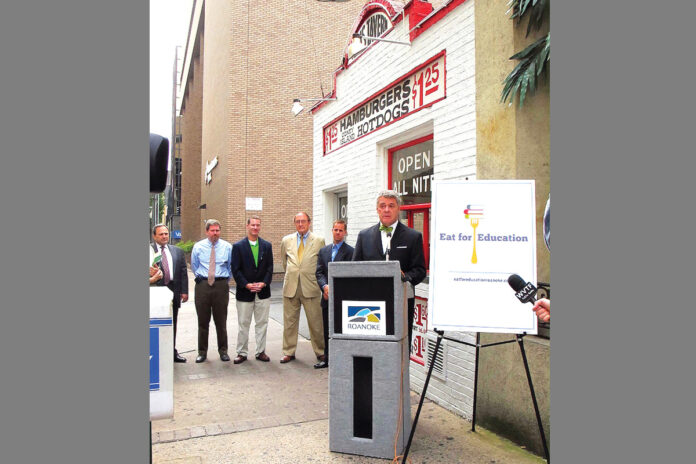In April Roanoke City’s director of finance Ann Shawver thought it “prudent to be conservative” in projecting sales tax revenue for fiscal year 2011. “Our sales tax revenue is taking us back to our fiscal 2004 times,” said Shawver.
At that point it was projected that the meals tax would generate $4.4 million to Roanoke City Public Schools, and Shawver cautioned that the actual number would be lower, “because that is one of the taxes that is contracting.”
But this week Shawver had some good news. For the month of July the Eat for Education component of the prepared meals tax came in 4.3% above the estimate.
In calculating for what are typically slow July spending habits, Shawver’s conservative estimate toward the RCPS funding goal was $359,000. (The expected monthly average to reach the $4.4 million goal works out to be $365,000 per month.) But July came in at $374,000 – $15,000 more than expected.
Compared to this time last year the meals tax as a whole is trending upward at .1% according to Shawver. Though it is only a very slight increase the number does give some hope for stabilization.
If the trend holds true the city will meet the fiscal year 2011 funding total for RCPS.
The anxiety that city prepared food establishments would experience a decline in patronage when the 2% increase in the meals tax went into effect seems to be unfounded – at least so far. The total city tax is 7% and with the state sales tax totals 12%. The 2% increase took effect in July for fiscal year 2011 and will sunset for 2013.
A clearer view will take a few more months to ensure the trend holds true. September taxes are due on the 20th.
Another gauge of the effect of the meals tax would be to compare dining facilities. The effect, if any, on banquet accommodations at hotel and conference centers could take a few months to ascertain.
At an April public hearing, the Hospitality Association opposed the meals tax increase, taking the position that it unfairly targets one industry. The association could foresee groups opting for a more tax-friendly locale for conventions. They compared the combined 19% lodging and meals tax to 11% at a place like The Homestead, saying that it makes it hard to compete.
A survey of waitress tips would add another perspective. Councilman Dave Trinkle owner of two restaurants said at the April public hearing, “personally I’d like to see a broader approach.” Restaurants are big employers and he worried about hurting labor.
Trinkle, who was chastised for paying the meals tax late on his two restaurants for eight consecutive months, paid the tax on time for July, according to Shawver. The city assistant attorney Tim Spencer decried use of the meals taxes for any purpose other than holding it in a lockbox for remittance to the city treasurer by the 20th of every month. “It’s not a slush fund,” declared Spencer in July.
By Valerie Garner [email protected]
